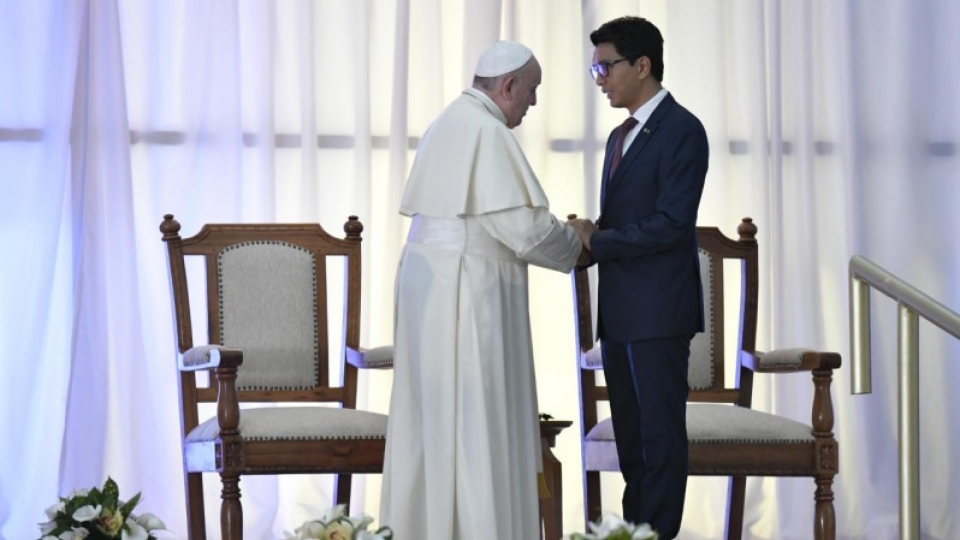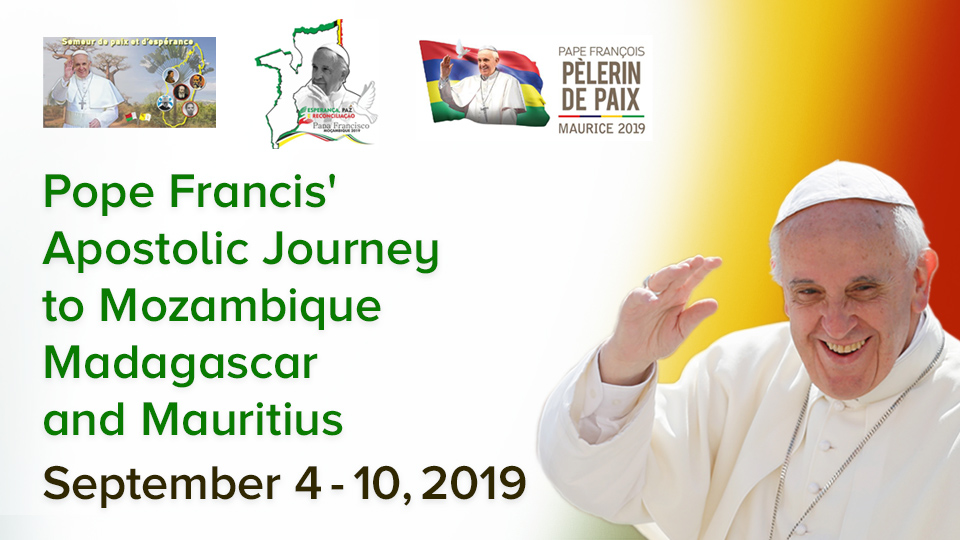

Pope in Madagascar: Visit to the President of the Republic of Madagascar and meeting with the Authorities, the Civil Society and the Diplomatic Corps.
Salt + Light Media
Saturday, September 7, 2019

Photo courtesy of Vatican News
On September 7, 2019 Pope Francis paid a Courtesy visit to the President of the Republic of Madagascar and meeting with the Authorities, the Civil Society and the Diplomatic Corps. Below is the full text of his prepared speech:
Visit to the President of the Republic of Madagascar and meeting with the Authorities, the Civil Society and the Diplomatic Corps.
Mr President, Mr Prime Minister, Members of the Government and the Diplomatic Corps, Distinguished Authorities, Representatives of the different Religious Confessions and of Civil Society, Ladies and Gentlemen, I offer a cordial greeting to the President of the Republic of Madagascar. I thank you, Mr President, for your kind invitation to visit this country, and for your words of welcome. Mr President, you spoke with passion and with love for your people. I thank you for your witness of patriotism. I likewise greet His Excellency the Prime Minister, the members of the Government and the Diplomatic Corps and the representatives of civil society. I also address a fraternal greeting to the Bishops and members of the Catholic Church, and to the representatives of other Christian confessions and of the different religions. I express my gratitude to all those persons and institutions who have made this visit possible, and in particular to the Madagascan people, who have welcomed us with impressive hospitality. In the Preamble of the Constitution of your Republic, you wished to enshrine one of the fundamental values of Madagascan culture: fihavanana, a word that evokes the spirit of sharing, mutual help and solidarity. It also evokes the importance of family, friendship and goodwill betweenpeople and with nature. It reveals the “soul” of your people, its distinctive identity that has enabledit to face with courage and self-sacrifice the various problems and hardships it faces daily. If we must recognize, esteem and appreciate this blessed land for its beauty and its priceless natural resources,we must do the same for this “soul”, which, as Father Antoine de Padoue Rahajarizafy, SJ, has rightly observed, has given you the strength to keep embracing “aina”, life. Ever since your nation recovered its independence, it has aspired to stability and peace, through a fruitful democratic alternation that shows respect for the complementarity of styles andvisions. This demonstrates that “politics is an essential means of building human community andinstitutions” (Message for the 2019 World Day of Peace, 1 January 2019), when it is practised as a means of serving society as a whole. Clearly, political office and political responsibility represent a constant challenge for those entrusted with the mission of serving and protecting their fellow citizens, particularly the most vulnerable, and of favouring conditions for a dignified and just developmentinvolving all the actors of civil society. As Saint Paul VI noted, the development of a nation “cannotbe restricted to economic growth alone. To be authentic, it must be integral; it must foster the development of each person and of the whole person” (Populorum Progressio, 14). In this regard, I would encourage you to fight with strength and determination against all endemic forms of corruption and speculation that increase social disparity, and to confront the situations of great instability and exclusion that always create conditions of inhumane poverty. Here we see the need to establish the various structural mediations that can assure a better division of income and an integral development of all, particularly those most poor. That development cannot be limited to organized structures of social assistance, but also demands the recognition of subjects of law called to share fully in building their future (cf. Evangelii Gaudium, 204-205). We have also come to realize that we cannot speak of integral development without showing consideration and care for our common home. This calls not only for finding ways to preserve naturalresources, but also for seeking “comprehensive solutions which consider the interactions within natural systems themselves and with social systems. We are faced not with two separate crises, one environmental and the other social, but rather with one complex crisis which is both social andenvironmental” (Laudato Si’, 139). Your lovely island of Madagascar is rich in plant and animal biodiversity, yet this treasure is especially threatened by excessive deforestation, from which some profit. The deterioration of that biodiversity compromises the future of the country and of the earth, our common home. As you know, the last forests are menaced by forest fires, poaching, the unrestricted cutting down of valuable woodlands. Plant and animal biodiversity is endangered by contraband and illegal exportation. It is also true, however, that, for the peoples concerned, a number of activities harmful to the environment at present ensure their survival. So it is important to create jobs and activities that generate income, while protecting the environment and helping people to emerge from poverty. In a word, there can be no true ecological approach or effective efforts to safeguard the environment without the attainment of a social justice capable of respecting the right to the common destination of earth’s goods, not only of present generations, but also of those yet to come. In this regard, it is incumbent on all to be involved, including the international community, many of whose members are present here today. It must be admitted that the aid provided by international organizations for the development of the country is great, and shows Madagascar’s openness to the larger world. Yet that openness can risk turning into a presumptive “universal culture” that scorns, submerges and suppresses the cultural patrimony of individual peoples. Aneconomic globalization, whose limitations are increasingly evident, should not lead to cultural uniformity. If we participate in a process respectful of local values and ways of life and of the expectations of citizens, we will ensure that the aid furnished by the international community will notbe the sole guarantee of a country’s development. The people itself will progressively take chargeand become the artisan of its own future. That is why we should show particular attention and respect for local civil society, local people. In supporting its initiatives and its actions, the voice of those who have no voice will come to be heard, together with the diverse and even dissonant harmonies of the national community in its efforts to achieve unity. I invite you to imagine this path, on which no one is swept aside, or left alone or becomes lost. As a Church, we wish to imitate the attitude of dialogue of your fellow citizen, Blessed Victoire Rasoamanarivo, whom Saint John Paul II beatified during his visit here thirty years ago. Her witness of love for this land and its traditions, her service to the poor as a sign of her faith in Jesus Christ, show us the path that we too are called to pursue. Mr. President, Ladies and Gentlemen, I wish to reaffirm the desire and the readiness of the Catholic Church in Madagascar, in ongoing dialogue with Christians of other confessions, the followers of the various religions and all the elements of civil society, to contribute to the dawn of a true fraternity that will always value fihavanana. In this way an integral human development can be fostered, so that no one will be excluded. With this hope, I ask God to bless Madagascar and those who live here, to keep your lovely island peaceful and welcoming, and to make it prosperous and happy! Thank you.Follow all of Salt + Light's coverage of Pope Francis' Apostolic Journey to Mozambique, Madagascar, and Mauritius by visiting our webpage!
Related Articles:
Category: Apostolic Journeys
Tag: Pope in Madagascar
Papal Visit to Corsica highlights Mediterranean Catholicism’s diverse spirituality
Friday, December 13, 2024
 Matthew Neugebauer
Matthew Neugebauer
On Sunday, December 15, Pope Francis is making a short trip to Ajaccio on the Mediterranean island of Corsica.
Pope’s General Audience – September 18, 2024
Wednesday, September 18, 2024
 Pope Francis
Pope Francis
In his weekly catechesis, Pope Francis reflected on his recent Apostolic Journey to Southeast Asia and Oceania.
Meeting with Authorities, Civil Society, and the Diplomatic Corps of Singapore: Address of His Holiness
Thursday, September 12, 2024
 Pope Francis
Pope Francis
Pope Francis addressed the authorities, civil society, and diplomatic corps of Singapore on the second day of his visit to the country.
Pope Francis’ Homily at Holy Mass in the Esplanade of Taci Tolu
Tuesday, September 10, 2024
 Pope Francis
Pope Francis
Pope Francis gave the homily at Holy Mass in the Esplanade of Taci Tolu in Dili, reflecting that "God shines his saving light through the gift of a son."
Interreligious Meeting: Address of His Holiness
Thursday, September 5, 2024
 Pope Francis
Pope Francis
Pope Francis addressed an interreligious meeting at the Istiqlal Mosque in Jakarta, on the second day of his Apostolic Visit to Indonesia.
1
2
3
4
5
6
7
8
9
10
11
...
122
>>
SUPPORT LABEL
$50
$100
$150
$250
OTHER AMOUNT
DONATE
Receive our newsletters
Stay Connected
Receive our newsletters
Stay Connected











